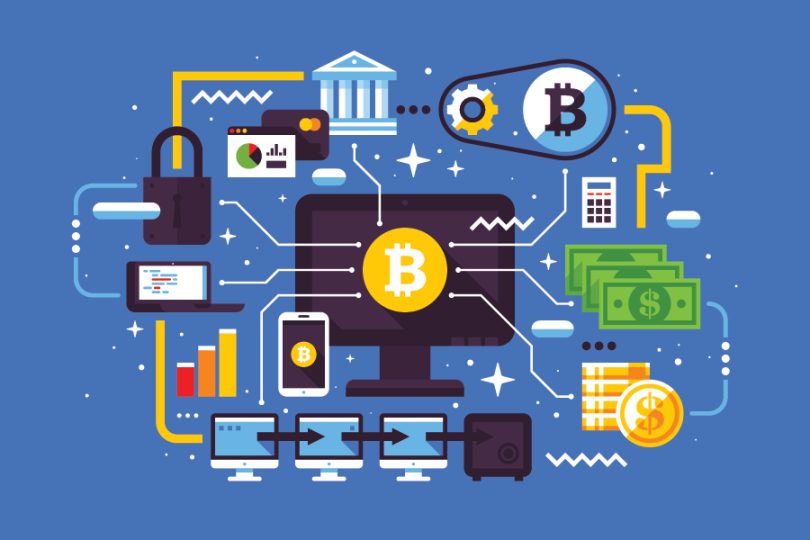Cryptocurrencies, NFTs, and decentralized finance are just a few completely new businesses to which blockchain technology has given rise. Existing industries now have the opportunity to both streamline their operations and save costs thanks to blockchain technology.
There are dozens of competing blockchains, each with benefits and drawbacks for specific applications. We’ll examine six of the most popular blockchains and the industries that employ them.
Table of Contents
1. Decentralized Banking with Ethereum
The 2013 Ethereum blockchain launch made it feasible for the immense blockchain development that has taken place over the last ten years.
Thanks to intelligent contracts in the first decentralized ledger, a wide range of automated, trustless transactions might be placed on blockchains. Ethereum also marketed itself as a developer-friendly platform to attract anyone interested in building blockchain-based apps.
Most currently in-use decentralized applications (dApps) rely on Ethereum. Another option is to create entire blockchains, such as Polygon, whose primary function is to connect Ethereum to other blockchains.
One of Ethereum’s most important industries is decentralized finance (DeFi). Ethereum has several DeFi applications, including Maker, Curve, Compound, SushiSwap, Euler Finance, and 1Inch. The entire value stored on the blockchain is about $23 billion.
2. Cardano – NFTs
Non-fungible tokens could be created thanks to blockchain technology (NFTs). These unique digital assets can represent memberships, pieces of art, or any other specific digital thing.
On Ethereum, the most important blockchain, many NFT efforts are built. Yet, for NFT developers and investors, the Cardano blockchain has cemented its position as a popular alternative. Several important NFT markets, such as JPEG Shop, CNFT.IO, and Tokhun, are headquartered in Cardano.
For NFT developers, Cardano stands out as a unique and enticing blockchain because it doesn’t require intelligent contracts for NFTs housed on it. Minting errors are less likely because NFT creation is connected with the blockchain. Cardano offers significantly lower transaction fees as compared to other blockchains like Ethereum.
3. Solana – Bitcoin Gambling
The online gaming industry has quickly embraced blockchain technology. Players benefit from bitcoin gambling over traditional online casinos and sportsbooks because it offers faster deposits and withdrawals, cheaper banking fees, and greater player anonymity.
One of the most popular blockchains for bitcoin gaming is Solana. Because Solana is built for blazing-fast processing, it is enticing. With casinos that offer high-definition video slots or stream live dealer games continuously, speed is crucial to guaranteeing a faultless player experience.
Solana offers some of the lowest transaction fees of any blockchain. As a result, gambling websites and consumers can benefit from cryptocurrency gaming without suffering substantial financial losses due to blockchain expenses.
4. Logistics and supply chains on IBM Blockchain
IT colossus As a private blockchain that it could employ at partner companies, IBM developed the IBM Blockchain. Because the IBM Blockchain was created by a well-known firm rather than a group of decentralized developers, it has earned support from numerous traditional enterprise-scale corporations.
Particularly in the supply chain and logistics industries, it has gained popularity. The IBM Blockchain can be used by businesses to track raw materials from sourcing through production and finally into the finished product. Thanks to IBM Blockchain, logistics businesses can track items as soon as they are added to the system.
Because the IBM Blockchain is designed to be flexible and scalable, businesses can rely on IBM’s knowledge to help with the rollout.
5. Cybersecurity using Hyperledger Fabric
The Linux Foundation, the group responsible for the Linux operating system, created the Hyperledger Fabric public blockchain. Despite being open-source instead of proprietary, it provides a structure akin to the IBM Blockchain.
One of the critical advantages of Hyperledger Fabric is that it can operate in closed deployments, allowing users to isolate transactions in private data collections. The Hyperledger Fabric is more intimate and secure due to these features, which is why the blockchain has proponents in the cybersecurity industry.
Two cybersecurity companies, Thales and DigiCert, worked together on Hyperledger Fabric to add trustless security keys to the system. Many other cybersecurity companies are turning to Hyperledger Fabric more to carry out security operations on the blockchain.
6. Ripple: A Global Financial Platform
Not quite a blockchain, Ripple is a consensus-based digital ledger. Ripple must now be a purpose-built solution rather than an open development platform.
Ripple makes international financial transactions more accessible. It is designed to speed up, reduce cost, and improve the convenience of currency conversion and international money transfers. Using Ripple, international payments can settle in seconds as opposed to days.
Various reputable financial institutions have adopted this ledger, including Bank of America, PNC Bank, Santander Bank, and Standard Chartered Bank. Ripple has been expanding its banking connections across Europe over the crypto winter. Ripple is managed by the non-profit The Ripple Foundation, despite not being wholly decentralized.
Conclusion
A new era in software creation has begun with the introduction of blockchain technology. Both entirely decentralized apps and better business procedures in centralized industries can be created using blockchain technology. Even though Ethereum is still the most used blockchain, networks like Cardano, IBM Blockchain, and Solana are widely used in specific industries.
Also read: How to Accelerate the Growth of Your Startups
Also read: Reasons for Oil Industries to Adopt Bitcoin.
- What are Sitewide Backlinks & Their Impact on Search Engine Ranking - May 22, 2024
- 10 Tips For How To Use Craigslist to Buy - May 5, 2024
- Best 5 ways to how to get play store back on my smartphone? - May 3, 2024



